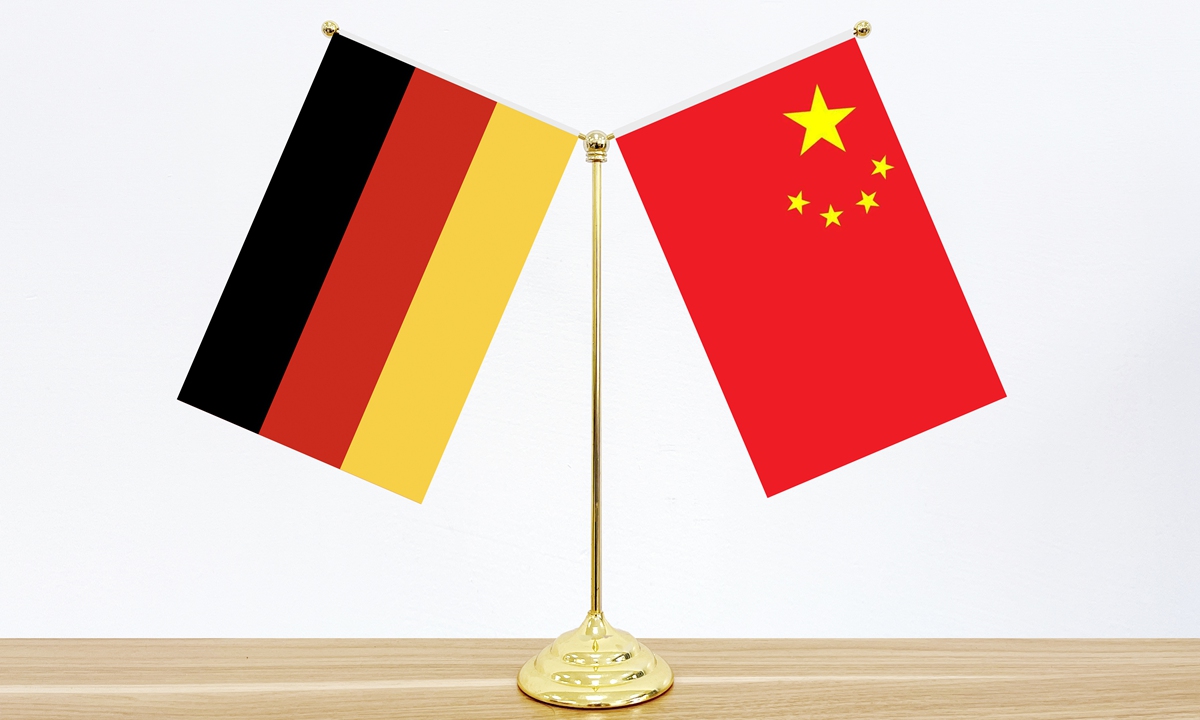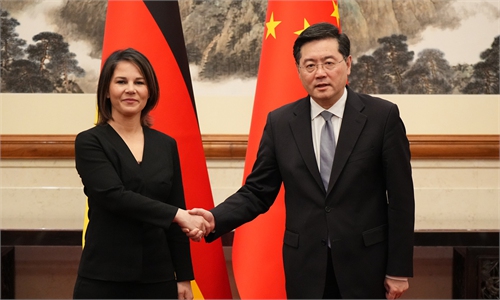Chinese top diplomat meets German FM, hoping Germany will support China's peaceful reunification

Photo:CFP
Chinese top diplomat Wang Yi met with visiting German Foreign Minister Annalena Baerbock on Saturday, saying that China is willing to strengthen communication and exchanges with Germany and pointing out that China supported Germany's reunification and hopes and believes that Germany will also support China's peaceful reunification.
Wang Yi, a member of the Political Bureau of the Communist Party of China (CPC) Central Committee and director of the Office of the Foreign Affairs Commission of the CPC Central Committee, said during the meeting that China and Germany share a wide range of consensus and common interests, and China is willing to strengthen communication and exchanges with Germany, enhance mutual understanding, and prepare for a new round of China-Germany government consultations. The two sides should jointly address global challenges such as climate change, promote the healthy development of bilateral relations, and release positive and constructive signals to the turbulent world, Wang told Baerbock.
The meeting came after Chinese State Councilor and Foreign Minister Qin Gang and the German FM had comprehensive, candid and in-depth communication on Friday over China-Germany, China-EU relations and international and regional issues.
Qin systematically elaborated on China's stance on the Taiwan question, stating that peace and "Taiwan independence" cannot co-exist and it is China's internal affair that allows no external interference.
On the Taiwan question, Wang told Baerbock that Taiwan's return to the motherland is an important part of the international order in the post-WWII era. "Taiwan independence" forces on the island are seeking to disrupt the current situation in the Taiwan Straits and endanger peace in the region. To maintain stability in the Taiwan Straits, it is necessary to firmly oppose the "Taiwan independence" separatist activities, Wang noted.
"China supported Germany's reunification, and hopes and believes that Germany will also support China's peaceful reunification," he told Baerbock.
Baerbock's visit to China came shortly after French President Emmanuel Macron's calls for Europe's strategic autonomy made waves within the continent and across the Atlantic, especially when the French President said that on Taiwan question, France should not get caught up in an escalation between the US and China.
Some Chinese experts see Macron's remarks as a wake-up call for Europe as in recent years, some European countries have been echoing the US' Indo-Pacific Strategy and NATO's Asia strategy of using the Taiwan question to contain China.
"It is believed that such in-depth dialogue on the Taiwan question would help the German side further understand China's position and the essence of the Taiwan question. As Baerbock is a young politician, it is important to elaborate on the history about the Taiwan question to her," Sun Keqin, a research fellow at the China Institutes of Contemporary International Relations, told the Global Times on Saturday.
Just hours ahead of Baerbock's visit to China, German Foreign Ministry on Wednesday claimed China "had inflamed tensions with its military exercise around Taiwan island."
Baerbock also warned against a "horror scenario" in case of "military escalation" in the Taiwan Straits after her meeting with Qin on Friday, saying that a unilateral, violent change of the status quo would not be acceptable for Europeans, according to media reports.
Some Europeans have been following the US rhetoric on the Taiwan question, and it's important to clarify on the matter about who changed the status quo and who escalated the situation, experts said. "Chinese officials have pointed out in a straightforward way that the 'Taiwan independence' separatists and their collusion with the US are endangering the stability in Taiwan Straits, Germany should understand this fact and should not go too far on the question," Sun said.
Baerbock said during her meeting with Wang that Germany understands the importance and sensitivity of the Taiwan question to China and adheres to the one-China policy.
It's very important for China as a permanent member of the UN Security Council and Germany as a major European country to strengthen dialogue and communication, the German diplomat said. The two countries have many common interests, and Germany is willing to strengthen interaction and communication with China, enhance mutual understanding, expand cooperation in economic, trade, tourism, cultural and other fields, jointly maintain smooth world trade, and continuously develop German-Chinese relations, Baerbock said.
Since the establishment of China-Germany diplomatic relations, Germany has adopted a rational and calm attitude on the Taiwan question as China had always supported Germany's reunification, but recently, the German Foreign Ministry, along with the EU, have been changing in accordance to the US' Taiwan policy, Sun said.
Fu Cong, head of the Chinese Mission to the EU, told the Global Times in a recent interview that concerning the Taiwan question, it's important to emphasize that any position of the European side on the question must be recognized by the Chinese side. And some high-level officials in EU institutions and European anti-China lawmakers visiting the island violated the one-China principle.
From the meeting with Ursula von der Leyen to the meeting with Baerbock, Chinese officials have made it very clear that the Taiwan question is China's core interests, serving as a warning against playing with the fire on the question, Sun noted. "It will be helpful for European officials to take a reflection on it and become more cautious before taking some moves," Sun said.


